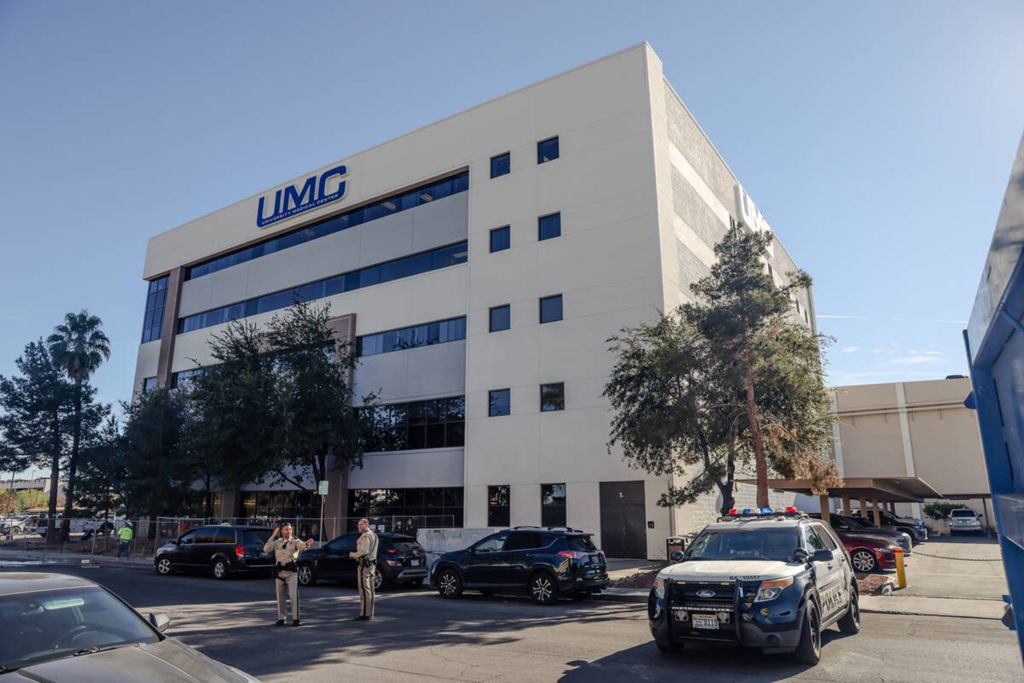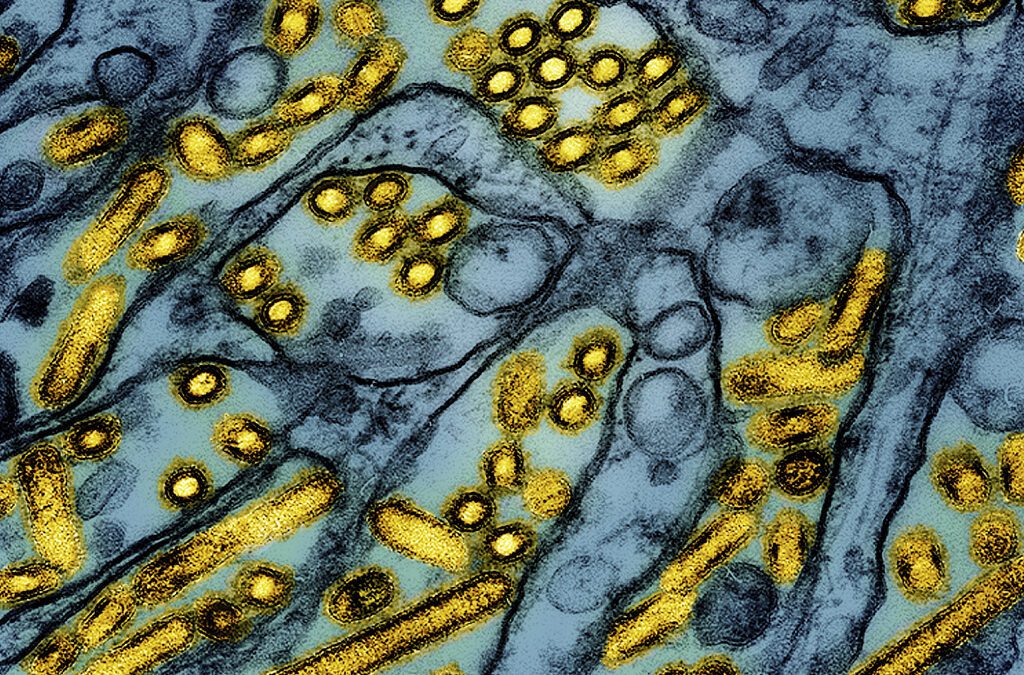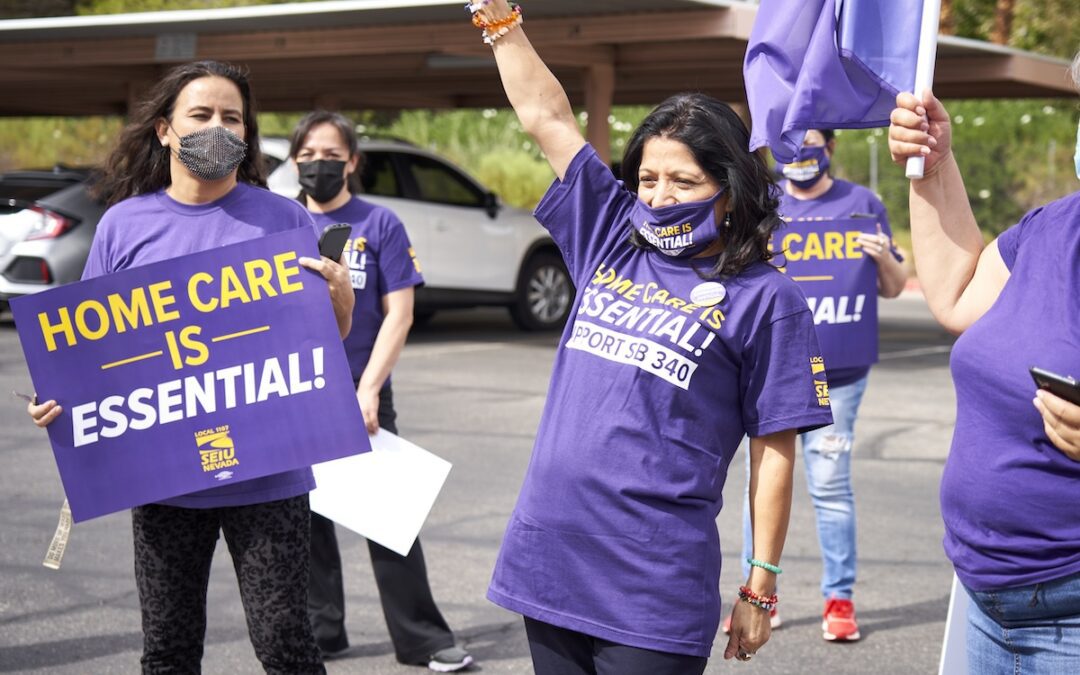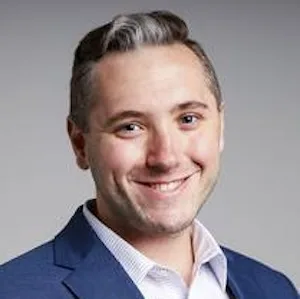
Police presence outside UMC hospital in Las Vegas, Wednesday, Dec. 6, 2023. (Rachel Aston/Las Vegas Review-Journal/Tribune News Service via Getty Images)
Nevada ranks 45th in the US for active physicians per 100,000 residents, and with seemingly little appetite to fund residency programs at the federal level, officials in the Silver State are mulling new ways to tackle a worsening issue.
A shortage of primary care doctors and other physicians has long hindered Nevadans’ access to healthcare and receiving that care more expensive, but a last-ditch effort from US Sen. Jacky Rosen in the waning days of the Biden administration is seeking to change that.
In a letter last month to Health and Human Services Secretary Xavier Becerra, Rosen, a Nevada Democrat, urged Becerra to increase the number of federally-funded medical residency slots allotted under a 2021 law that created 1,000 new full-time residency positions nationwide.
Of those 1,000 new slots, approximately 600 have yet to be awarded, Rosen said, adding that only a few of those have been given to Nevada and that census data showed Nevada was the fastest-growing state from 2000 to 2023.
“Today our state is facing a dire shortage of doctors, making it challenging for many Nevadans to access the quality, affordable health care that they need,” Rosen wrote. “Please
provide information on why our state has received so few GME (graduate medical education) slots in the first two distribution rounds, along with specific information on any steps that can be taken to improve the likelihood
of Nevada hospitals receiving more slots in the upcoming rounds.
“Additionally, please provide recommendations on the best approach for rebasing the outdated GME caps and adjusting allocation based on current state populations, with consideration for recent and continued growth,” the letter continued.
Nevada ranks 45th in the US for active physicians per 100,000 residents, according to the American Medical Association, and additionally ranks 48th for primary care physicians, and 49th for general surgeons. Nevada additionally ranks 24th for its proportion of undergraduate medical students, the state is 41st for the number of residency and fellowship positions available.
With about 7,400 licensed physicians already operating in the state, Nevada would need an additional 2,500 to reach the national standard, according to a 2023 article published in the National Library of Medicine.
And while doctors of nearly every specialty are needed in Nevada, Marc Kahn Dean of the Kirk Kerkorian Medical School at UNLV told The Nevadan that the state is also in dire need of professionals across the healthcare industry, such as nurses, lab technicians, pharmacists, and a slew of other vocations. Compounded by an aging population, the shortage has driven Nevada officials to find new ways to attract new medical workers.
“The secret to getting more doctors here in Nevada, where we desperately need physicians, is that we need more residency positions. It’s really that simple,” Kahn said, pointing out that the 2021 law Rosen cited only created 1,000 positions nationwide over five years.
“And, for example, if you’re doing an internal medicine program, that’s a three-year program. So that actually counts as three positions,” Kahn continued
Kahn additionally told The Nevadan that Rosen’s efforts are well-intentioned, but with residency shortages becoming more commonplace in states outside Nevada, he believes the federal government would have acted by now if were going to make reforms to the medical residency program, which is administered by Centers for Medicare & Medicaid Services.
Aside from a few small instances like the 2021 law, or a 2023 law that added funding for an additional 200 residencies, funding has largely remained locked in at levels last approved by Congress in 1996, Kahn said.
“We were a very different state than what we are now,” Kahn said, noting that much of the urban sprawl throughout Las Vegas began after funding levels from the late ‘90s were locked in. “States like ours suffer because we’ve had tremendous population growth since the positions were frozen. Other states haven’t had that.”
“To put things into perspective, Nevada has about 403 CMS-funded positions for the entire state, while California has over 9,000 and New York has 19,000,” Kahn continued. “So we are woefully underfunded from a residency perspective.”
To address those issues, Kahn said, health educators in Nevada are turning to the state level to invest meaningfully into programs to bolster the healthcare workforce. States like Texas in recent years have begun to allocate funding for their own residency programs — a model that Kahn said could be successful here in Nevada.
Kahn added that pupils who graduate medical school and finish their residency in-state have about an 80% likelihood of remaining in Nevada to practice, and that the goal for officials like him is to convince lawmakers to provide incentives to lure students into the field.
Some proposals — such as easing some licensing regulations — were enacted during last year’s legislative session, but Kahn said he is hoping lawmakers consider other bills once the 83rd legislative session begins in February to flesh out specialty training programs in areas like hematology, ophthalmology, oncology, and other areas that yet to exist in Nevada.
“We’re growing some of these programs at UNLV, but you have to be creative with financing,” Kahn said.
Regardless, Rosen told The Nevadan in a statement her office will continue to advocate the White House for any opportunity to give Nevada new residency positions.
“Our state is facing a dire shortage of medical providers, making it difficult for too many Nevadans to access quality health care services they need,” Rosen said in a statement. “That’s why I will continue to push to bring additional GME residency slots to Nevada, regardless of the administration in charge, so that more doctors can stay in our state after being trained in our universities. With all 17 of our counties experiencing a physician shortage, we must take swift action to address this critical issue.”

New strain of bird flu is detected in a Nevada dairy worker, CDC says
By Mike Stobbe and Jonel Aleccia According to state health officials, the dairy worker was exposed at a farm in Churchill County, in the west...

Wage increase shows early success in stabilizing Nevada home care workforce
Seniors have officially outnumbered children for the first time in US history. But Nevada's new minimum wage increase for care workers offers a...

Registró Nevada Health Link un récord de inscripciones en su período de inscripción abierta de 2025
Se inscribieron más de 110.000 nevadenses, lo que supone la inscripción más numerosa en la historia del mercado en Nevada. Nevada Health Link logró...

Feds approve Nevada public option health insurance plans
In becoming the third state to offer publicly-available health care plans, officials say residents can soon expect lower premiums and improved...

Nevada seniors’ drug costs are now capped at $2,000 per year
The out-of-pocket cost of prescription drugs for Medicare Part D enrollees is now capped at $2,000 per year, thanks to President Joe Biden’s...

Santa Claus celebró Navidad en el hospital Intermountain; recién nacidos reciben una gigantesca bota navideña
Santa Claus hizo entregas especiales a bebés recién nacidos en un centro hospitalario cumpliendo así 15 años de una hermosa tradición decembrina....




